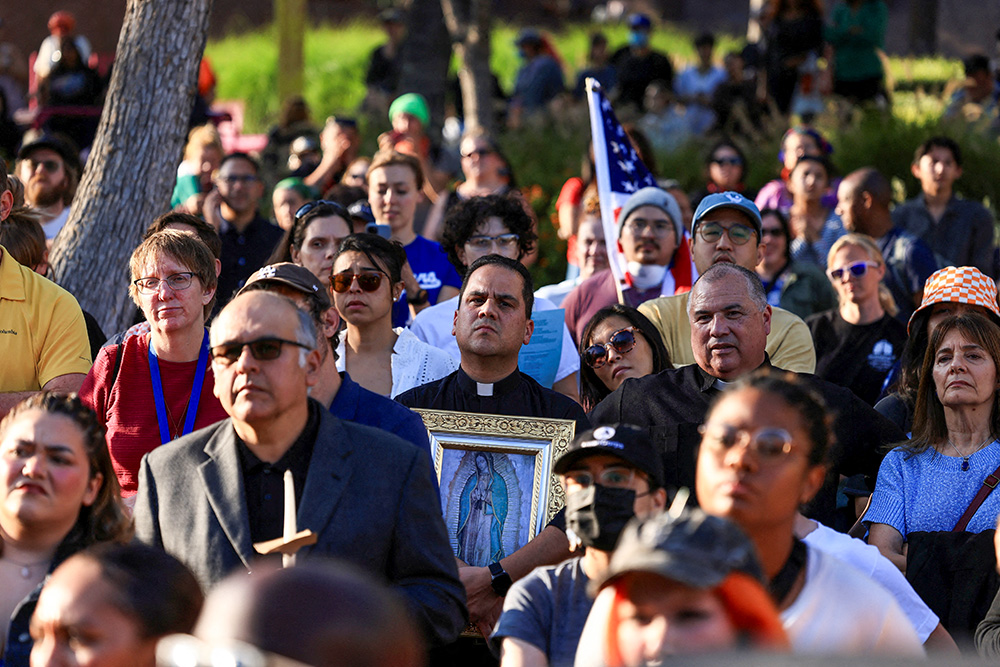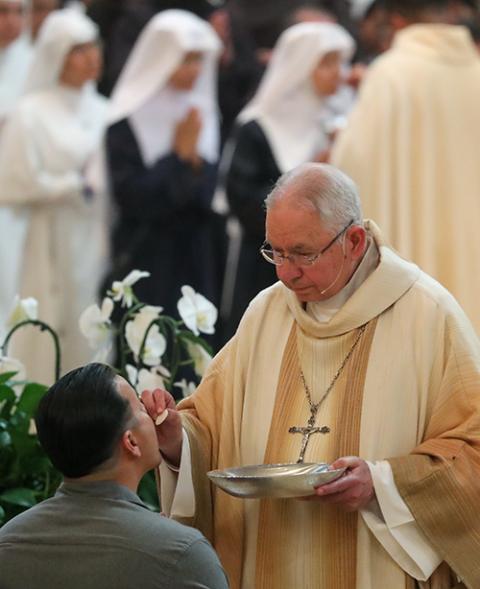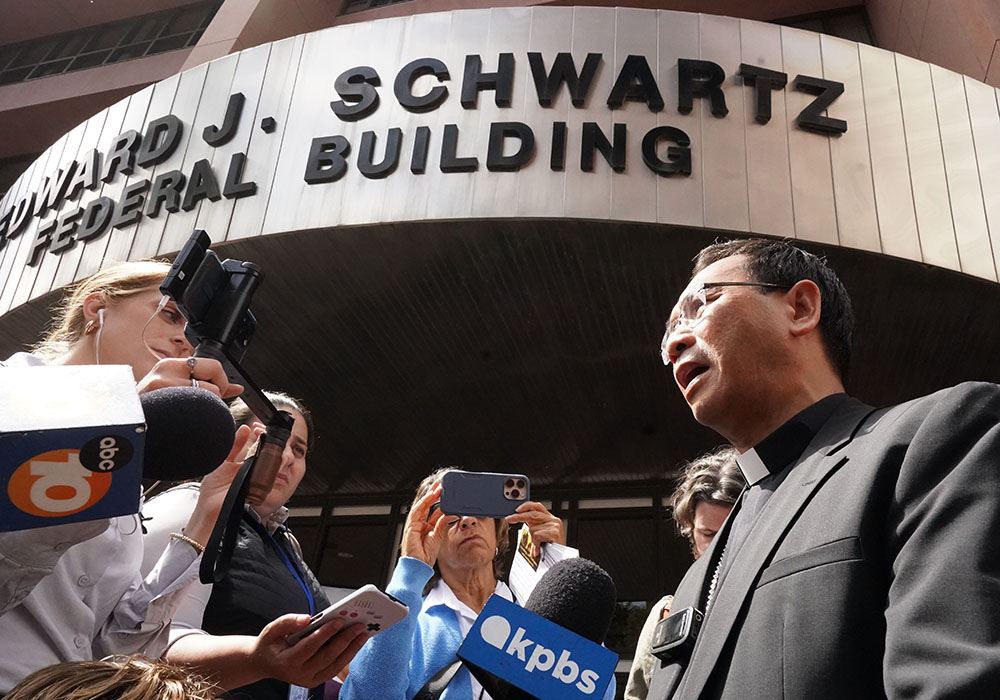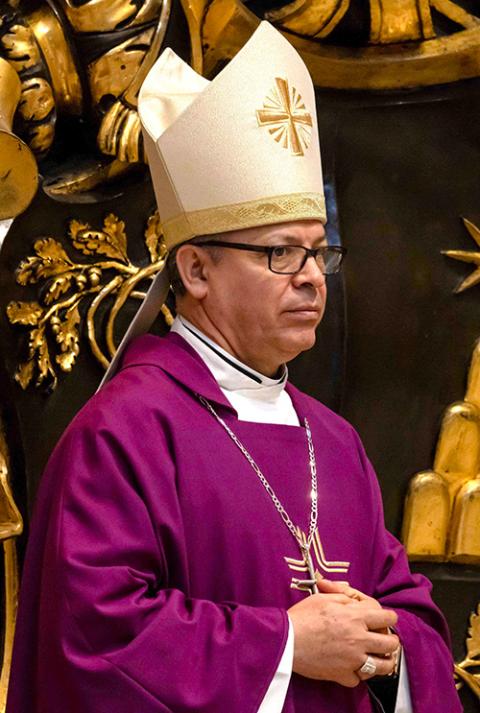
A member of the clergy holds an image of Our Lady of Guadalupe at a vigil in Grand Park in downtown Los Angeles June 10, 2025, as protests against federal immigration sweeps continue. (OSV News/Reuters/David Swanson)
As the Trump administration continues its aggressive deportation campaign, Roman Catholic bishops across Southern California are scrambling to tend to their panicked congregations by issuing strong statements of condemnation and, in one case, resorting to an extraordinary measure.
Bishop Alberto Rojas of San Bernardino on July 8 issued a decree freeing members of the diocese from the Sunday and Holy Day obligation to attend Mass when they fear "potential immigration enforcement actions by civil authorities."
San Bernardino joins the Diocese of Nashville, Tennessee, in dispensing Catholics from the obligation to attend Mass. Such dispensations occur on special occasions and circumstances, such as the global pandemic, but this marks a rare occasion where U.S. government enforcement actions have resulted in such a move.
Rojas' decree comes two weeks after federal agents detained migrants on Catholic Church property at two parishes in his diocese about 60 miles east of Los Angeles. Those actions reversed decades-old norms that fear of arrest or harassment should not deter people from practicing their religion.
The unusual moves come as more and more bishops have begun to speak out about President Donald Trump's policy of mass deportation deploying aggressive tactics that have terrified many immigrant populations, including many in the country legally.
"This is not policy, it is punishment, and it can only result in cruel and arbitrary outcomes," Archbishop José Gomez of the Los Angeles Archdiocese wrote in a recent column.
Gomez, a Mexican immigrant himself, has long supported immigration reform, but he has become more openly critical of the Trump administration, condemning the raids, as deportation tactics have escalated.
Theologians and church observers say it's noteworthy that bishops like Gomez are taking a stand, even though they may want to be more cautious in speaking out to prevent upsetting conservative donors, parishioners or even the president. But some argue that Catholic faith leaders across the country need to be doing more.

Los Angeles Archbishop José Gomez distributes Communion at a Mass at the Cathedral of Our Lady of the Angels in Los Angeles June 22, 2025, during the National Eucharistic Pilgrimage. (OSV News/Bob Roller)
Ish Ruiz, a theologian at the Pacific School of Religion in Berkeley, California, said he has been frustrated that many U.S. bishops have seemingly cozied up to the Republican Party, preoccupied with pushing an anti-abortion agenda and railing against "woke" culture. In doing so, bishops have let immigrants fall through the cracks, he said.
"Suddenly the bishops have decided to wake up, and it is too late because people are getting carted off," Ruiz said.
Since operations began in June, federal agents have arrested about 2,800 undocumented immigrants, according to Department of Homeland Security figures released to the Los Angeles Times Tuesday, July 8. On Monday, dozens of armed, masked federal agents made their latest show of force at MacArthur Park, in one of Los Angeles' most immigrant-heavy neighborhoods. It's unclear if anyone was arrested.
Some Catholic leaders in Los Angeles have been on the front lines. Jesuit Fr. Brendan Busse, pastor of Dolores Mission Church in Boyle Heights, volunteers with his neighborhood's rapid response network and is trained to offer support and resources to families when U.S. Immigration and Customs Enforcement activity is reported.
Busse said he was recently called for help after ICE vehicles rammed a car about a mile from his parish and removed a man from the car, leaving his wife and two babies in the back seat. When Busse arrived, the fire department was giving medical assistance to the mother. He still recalls the diaper bag sitting in the back seat of the pummeled car.
"The language the community has been using is that they feel hunted," Busse said. "They feel like there's these masked men who are going around just kidnapping people. It's much, much different than the way this enforcement has happened in the past."
The ICE raids and the fear they induce is not limited to the Los Angeles area.
In San Bernardino County, as the National Catholic Reporter reported earlier, two men were taken into custody on the grounds of St. Adelaide Parish in Highland, on the same day a longtime parishioner of Our Lady of Lourdes in Montclair was picked up on church property.
"Authorities are now seizing brothers and sisters indiscriminately, without respect for their right to due process and their dignity as children of God," Rojas wrote on June 23 in a letter to the diocese's faithful.
San Bernardino Diocese spokesman John Andrews said that the diocese has been bracing for something like this since the Trump administration took office in January. In preparation, the diocese has collaborated with local immigrant rights organizations and held workshops in its parishes and online to help parishioners understand how to respond if they encounter an ICE agent.
Busse, Andrews and others said the president's deportation campaign has affected attendance at Mass. And it's not just worship. Street vendors are staying home. Restaurants are closed. Families are nervous to go to the supermarket or to take their children to summer camps or doctor's appointments. Busse said parishioners have told him it feels like another pandemic.
The Boyle Heights priest said he's heartened by the support from his interfaith neighbors. For example, members of Nefesh, a Jewish community group in Los Angeles, have volunteered for the past couple weeks to stand outside the Dolores Mission Church and monitor the grounds, so folks can go inside and celebrate Mass without looking over their shoulders.
Cecilia González-Andrieu, president of the Academy of Catholic Hispanic Theologians of the United States, said she wants to see more Catholic leaders taking action like this that, most importantly, allows them to be visible in the community. She applauded Michael Pham, for one — the newly appointed bishop of the San Diego Diocese and a refugee from Vietnam, who has joined other faith leaders to accompany asylum seekers at their immigration hearings.

Bishop Michael Pham talks to reporters about his federal court visit to support immigrants at the Edward J. Schwartz Federal Building and U.S. Courthouse on World Refugee Day, June 20, 2025, in San Diego. (Chris Stone)
Kevin Eckery, a spokesperson for San Diego's diocese, said the intent was not to stage a protest, but merely to be present and show love and support. The faith leaders' accompaniment appeared to improve outcomes for the asylum seekers. Eckery recalled that the first day they sat in on the hearings, no one was arrested, and the ICE agents quietly left the courtroom area.
"I think that our presence there made people examine their conscience," Eckery said. "These random arrests with faceless, scary people, they're using fear and, frankly, almost terror to try and carry out public policy. There's nothing Christian about that."
Other dioceses have also worked to be present in the community. Isaac Cuevas, director of immigration affairs for the Los Angeles Archdiocese, said several of its parishes have been doing prayer vigils and making deliveries from food pantries to those who can't leave their homes.
Jarryd Gonzales, spokesperson for the diocese in neighboring Orange County, said the diocese has shared response protocols and distributed resource tool kits. The bishops from the Orange Diocese have visited impacted communities to offer prayer, and, following Pham's example, are coordinating priests and deacons to accompany individuals at immigration court hearings.
In June, the Orange bishops issued a statement condemning the Trump administration for spreading "crippling fear and anxieties upon the hard-working, everyday faithful among us."
Advertisement
González-Andrieu, who is also a theology professor at Loyola Marymount University in Los Angeles, said that while some bishops and faith leaders have been drawing attention to the human rights violations, the majority of people are still not discussing the raids in their parishes. She said Latino communities feel isolated, especially in politically divided churches where many of their, often white, fellow parishioners support the current administration.
Brett Hoover, another theology professor at Loyola Marymount University, said that while none of Southern California's local bishops would support mass deportation or the aggressiveness of the raids, some priests could be concerned about speaking out due to worries about alienating parishioners or because the priests are on visas themselves.
While bishops like Gomez have spoken out, Hoover explained that it was likely a difficult decision. Though Gomez is an immigrant and serves an archdiocese that is majority Hispanic, he also has connections with conservative Catholic groups, like the Napa Institute.
Hoover explained that a cautious leader like Gomez is not going to speak out with the passion of Cardinal Robert McElroy, the archbishop of Washington D.C., who has frequently railed against Trump's immigration policies, calling them, in a July 1 interview with CNN, "inhumane" and "morally repugnant." But Gomez, like other faith leaders, is now speaking a bit louder.
"There are so many immigrants and so many undocumented immigrants that no one is untouched by this," Hoover said. "So as things continue to deteriorate, many who have remained quiet may find themselves, like the archbishop, forced to speak out."






